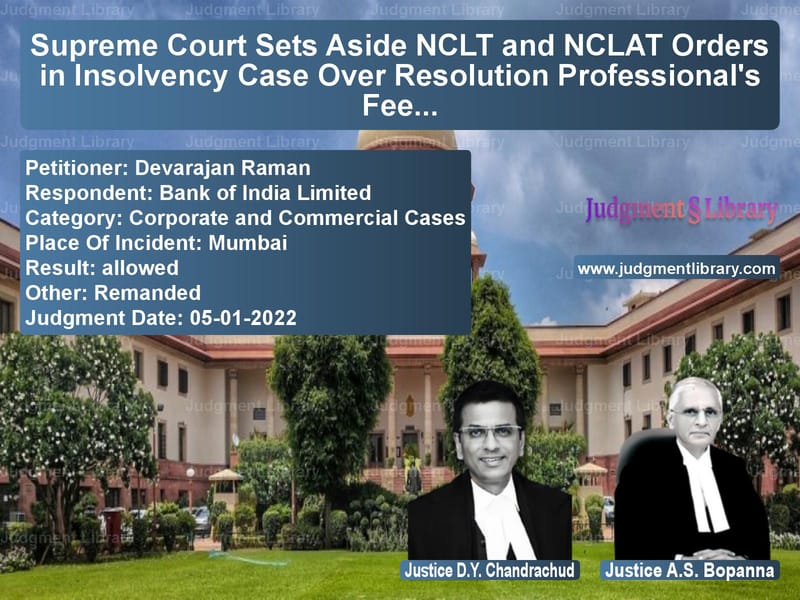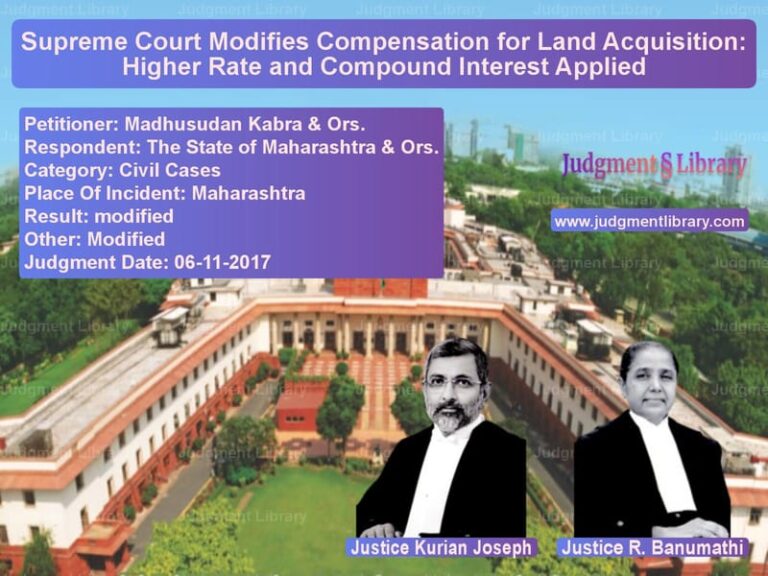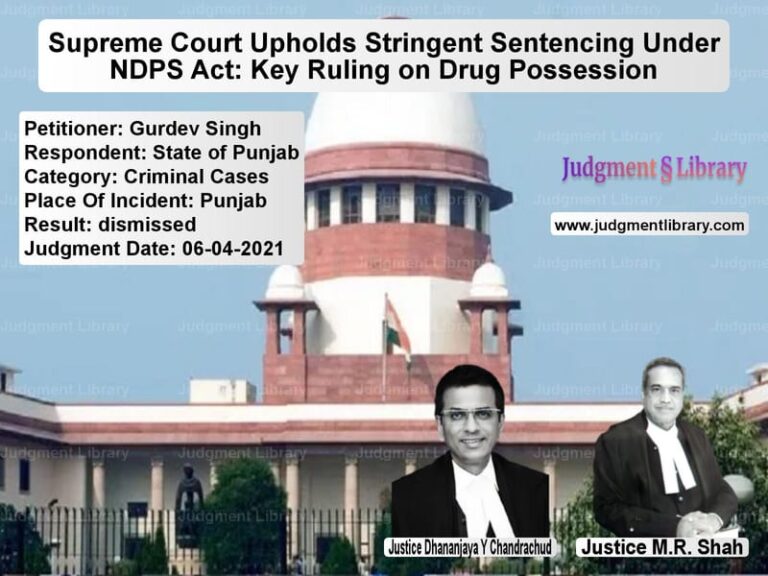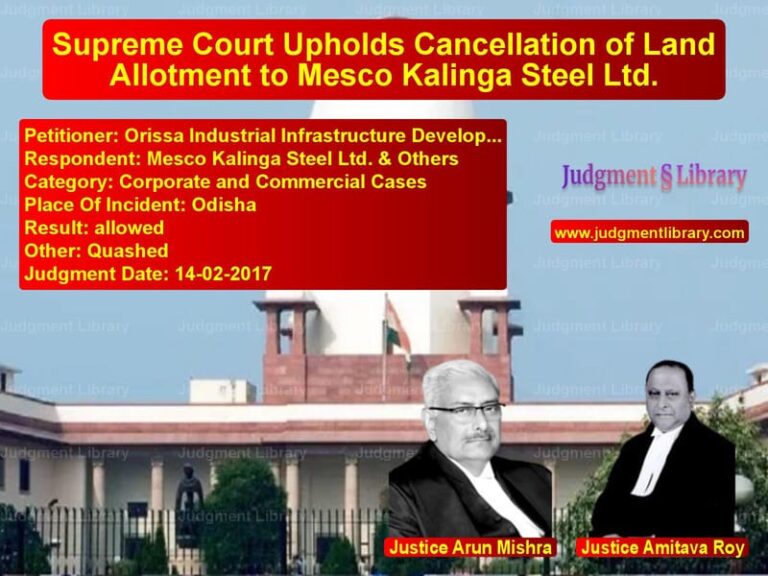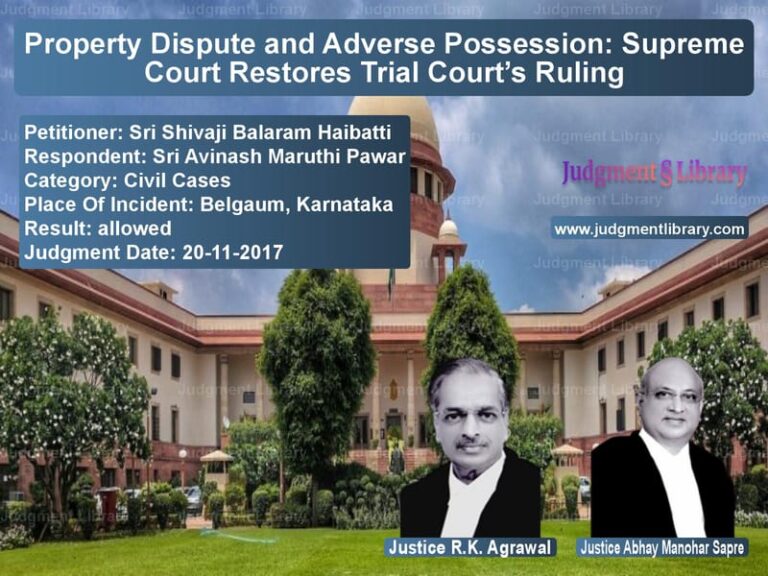Supreme Court Sets Aside NCLT and NCLAT Orders in Insolvency Case Over Resolution Professional’s Fees
The case of Devarajan Raman vs. Bank of India Limited is a significant ruling by the Supreme Court regarding the payment of costs and expenses incurred by a Resolution Professional (RP) in the Corporate Insolvency Resolution Process (CIRP). The Court set aside the orders of the National Company Law Tribunal (NCLT) and the National Company Law Appellate Tribunal (NCLAT), stating that both authorities failed to properly examine the claim of the RP before arbitrarily reducing his fee.
Background of the Case
The dispute arose when Devarajan Raman, a Resolution Professional, sought payment for the costs and fees incurred while managing the CIRP of Poonam Drums and Containers Pvt. Ltd. The respondent, Bank of India, was a financial creditor in the insolvency process.
The key events in the case were:
- On March 8, 2019, the Bank of India filed a petition under Section 7 of the Insolvency and Bankruptcy Code (IBC) against Poonam Drums and Containers Pvt. Ltd.
- On September 20, 2019, the NCLT admitted the case and appointed Devarajan Raman as the Interim Resolution Professional (IRP).
- On December 19, 2019, the NCLAT set aside the insolvency proceedings at the request of the Corporate Debtor’s Directors.
- The NCLT was then directed to determine the fees and expenses incurred by the RP, which were to be paid by the Bank of India as the financial creditor.
- The RP submitted a claim for Rs. 14,75,660, of which Rs. 5,66,667 was reimbursed, leaving a balance of Rs. 9,08,993.
- On February 7, 2020, the NCLT, without examining the details, arbitrarily fixed the RP’s fee at Rs. 5,00,000 plus GST, without citing any reasons.
- The NCLAT upheld the NCLT’s decision, stating that the amount awarded was reasonable.
Legal Issues Raised
- Whether the NCLT and NCLAT were justified in arbitrarily fixing the RP’s fees without examining the agreed terms.
- Whether an RP is entitled to claim fees and expenses based on the technical and financial bid agreed upon with the financial creditor.
- Whether the CoC’s approval of the RP’s fees should have been given more weight.
Arguments of the Petitioner (Devarajan Raman)
The petitioner, through legal counsel, presented the following arguments:
- Violation of Contractual Terms: The RP’s fees and expenses were pre-approved in the technical and financial bid and later ratified by the Committee of Creditors (CoC).
- Failure of NCLT to Scrutinize the Claim: The NCLT arbitrarily decided the fee amount without assessing the actual work done by the RP.
- Financial Creditor’s Acknowledgment: The Bank of India had verified and agreed to the fee amount in its letter dated January 24, 2020.
- Unjust Reduction of Fees: The NCLAT failed to give proper reasoning for why Rs. 5,00,000 was a reasonable fee.
Arguments of the Respondent (Bank of India)
The respondent countered the petitioner’s claims, stating:
- Limited Work Done: The RP worked only for three months, whereas the usual insolvency process lasts 180 days.
- No Formal Challenge to NCLAT Order: The RP did not challenge the earlier NCLAT decision remanding the case to the NCLT.
- Payment Was Reasonable: The Bank had already reimbursed Rs. 7,09,154 to the RP, which it considered adequate compensation.
Supreme Court’s Observations
The Supreme Court, comprising Justices Dr. D.Y. Chandrachud and A.S. Bopanna, made the following key observations:
- NCLT’s Arbitrary Decision: The NCLT did not assess the RP’s claim based on facts and merely assigned an ad hoc amount.
- NCLAT’s Failure to Provide Reasons: The appellate tribunal did not independently verify whether Rs. 5,00,000 was a reasonable amount.
- Binding Agreement Between the Parties: The Bank of India had agreed to pay the RP’s fees as per the bid terms, which should have been upheld.
- Importance of Ensuring Fair Compensation: The Court noted that Insolvency Resolution Professionals play a crucial role in CIRP and must be paid fairly for their work.
Final Judgment
The Supreme Court allowed the appeal and set aside the orders of the NCLT and NCLAT. The judgment stated:
“The appeal is allowed, and the impugned judgment and order of the NCLAT dated 30 July 2020 is set aside. Similarly, the order of NCLT dated 7 February 2020 is set aside. MA No. 223/2020 in CP (IB) 970/MB/2019 is restored to the file of the NCLT for a decision afresh.”
The NCLT was directed to re-examine the matter and conclude the proceedings within one month.
Implications of the Judgment
This ruling has several important implications:
- Ensuring Fair Compensation for RPs: Resolution Professionals must be paid as per agreed terms, and their fees cannot be arbitrarily reduced.
- Strengthening Due Process: Adjudicating authorities must provide proper reasons when deciding fee disputes.
- Clarification on CIRP Costs: This judgment reinforces that the financial creditor must bear the costs of CIRP as per IBC regulations.
- Judicial Scrutiny Over NCLT/NCLAT Decisions: The Supreme Court has set a precedent that orders without reasoning will be subject to judicial review.
Conclusion
The Supreme Court’s decision in Devarajan Raman vs. Bank of India Limited ensures that RPs are fairly compensated and that adjudicating authorities follow due process when determining insolvency-related expenses. By setting aside the NCLT and NCLAT orders, the Court reaffirmed the importance of reasoned decision-making in insolvency proceedings.
Petitioner Name: Devarajan Raman.Respondent Name: Bank of India Limited.Judgment By: Justice D.Y. Chandrachud, Justice A.S. Bopanna.Place Of Incident: Mumbai.Judgment Date: 05-01-2022.
Don’t miss out on the full details! Download the complete judgment in PDF format below and gain valuable insights instantly!
Download Judgment: devarajan-raman-vs-bank-of-india-limite-supreme-court-of-india-judgment-dated-05-01-2022.pdf
Directly Download Judgment: Directly download this Judgment
See all petitions in Bankruptcy and Insolvency
See all petitions in Corporate Compliance
See all petitions in unfair trade practices
See all petitions in Judgment by Dhananjaya Y Chandrachud
See all petitions in Judgment by A. S. Bopanna
See all petitions in allowed
See all petitions in Remanded
See all petitions in supreme court of India judgments January 2022
See all petitions in 2022 judgments
See all posts in Corporate and Commercial Cases Category
See all allowed petitions in Corporate and Commercial Cases Category
See all Dismissed petitions in Corporate and Commercial Cases Category
See all partially allowed petitions in Corporate and Commercial Cases Category

